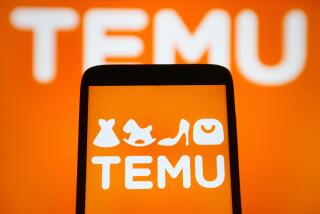Levi Strauss Decides Against Investing in China : Trade: The clothing maker will also cut back on sewing and finishing contractors because of human rights violations.
- Share via
SAN FRANCISCO — Clothing giant Levi Strauss & Co. said Monday that it will not make direct investments in China, and it will reduce its use of contractors there because of that country’s human rights record.
Bob Dunn, Levi Strauss’ vice president of corporate affairs, said the company was engaged in a serious and comprehensive effort “to ensure that it is comfortable about the places where its products are made and sewn.”
The decision not to invest in China was taken after an internal task force recently completed a review of the company’s business with China, he said.
“The conclusion was that we will not pursue a direct investment at this time, though we are hopeful that the situation will change and that that’s something we can do in the future,” Dunn said in an interview.
He said the company will also “begin to reduce our use of sewing and finishing contractors in China.” He said it would be a “phased and orderly reduction.”
San Francisco-based Levi Strauss, known worldwide for its jeans and other clothing, is a private company with operations in about 40 countries. It had worldwide revenue last year of $5.6 billion.
Dunn said the company had been looking at every country where it now has products made and where it was considering a direct investment to determine whether they met contracting guidelines the company adopted a year ago.
One of the guidelines states that the company will not contract out work “in countries where there are pervasive violations of basic human rights.”
Last year, Levi Strauss decided to stop using contractors in Burma after deciding it failed to meet its guidelines.
Dunn declined to single out what human rights the company believed were being violated in China, but said Levi Strauss used the U.N. declaration on human rights as a benchmark for examining each country’s record.
Levi Strauss now has no direct investment in China. It uses about 30 contractors there that sew and launder pants and shirts for export to the U.S. and other nations.
They account for about 2% of Levi Strauss’ worldwide volume, but Dunn said he could not put a figure on their value.
Dunn stressed that the company’s decision had no connection with the issue of most-favored-nation trading status for China, which is up for renewal by the United States this year.
He said the company will continue to make a small amount of retail sales through hard-currency stores in China. It will also continue to purchase fabric from China “at least for the time being.”
The company’s purchasing guidelines are not now applied to the purchase of fabric but might be extended to include it, he said.
More to Read
Inside the business of entertainment
The Wide Shot brings you news, analysis and insights on everything from streaming wars to production — and what it all means for the future.
You may occasionally receive promotional content from the Los Angeles Times.










